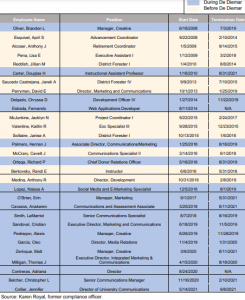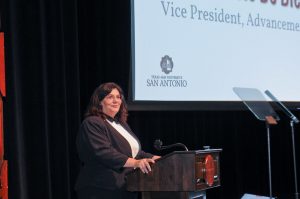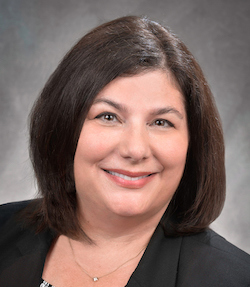Texas A&M University-San Antonio’s Marketing and Communication leader resigned last semester and was replaced this March after a tenure marked by high turnover and formal complaints of discrimination, poor leadership, retaliation and overworking staff.
However, university President Cynthia Teniente-Matson said Jeanette De Diemar, former vice president for advancement and external relations, helped strengthen the university’s message for enrollment management and university recognition nationwide.
While the university says it found no evidence of the discrimination allegations, an A&M-San Antonio investigation concluded the university took “appropriate action” on complaints of poor leadership and retaliation, according to university reports. However, former employees say they weren’t satisfied.
De Diemar arrived at A&M-San Antonio March 25, 2019, and departed December 2021. Jesse Pisors began serving as the new vice president for university advancement and external relations March 28.
Throughout De Diemar’s roughly two-and-a-half-year term, 17 people left the department, compared with 12 in the five years before De Diemar took the reins.
The Mesquite interviewed four former Marcom employees on the record and three who requested anonymity about the working conditions in the department. All seven agreed the department needs a leader willing to improve morale.
The Mesquite also obtained documents and emails from open records requests and former employees.
De Diemar declined to talk about this matter with the Mesquite.
Marcom, which is part of University Advancement and External Relations, supports the university’s mission and goals by promoting A&M-San Antonio’s brand and increasing awareness of the university. The department handles university media relations, videography and photography, creative design services, social media and editorial services.
John LoCurto, deputy Title IX coordinator and chief compliance officer, from fall 2018 to August 2020, said he witnessed constant turnover at the university, though turnover is common in different organizations.
“What was problematic from my perspective was that for a new entity that was trying to pursue President Matson’s audacious goals for the campus, having so much turnover really was an obstacle that kind of got in the way,” LoCurto said.
LoCurto said he saw a lot of people shifting between departments in addition to seeing a steady turnover, especially in Marcom.
“Within a couple of months of my arrival the entire communications department was gone. That was challenging. It affected our ability to message and market to communicate,” LoCurto said.
Former Senior Communications Specialist LaMarriol Smith worked at A&M-San Antonio from August 2018 to August 2019. She said there were Marcom employees who had worked there for years before De Diemar’s arrival. After De Diemar joined the department, many of those people left.
Smith said she witnessed a few staff members leave the department before her own departure.
Smith said “it was just a revolving door for most of the positions there” after the departure of Cristian Sandoval, executive director of Marketing and Communications from June to November of 2019.

Former Marcom employees talk working conditions
Ana Cavazos, social media manager in the department from March 2018 to June 2021, said she experienced harassment and discrimination while working in Marcom. She said she saw this behavior directed toward people who were of another national origin.
Cavazos, who is from Mexico, said whenever she was speaking, De Diemar would say she didn’t understand her because of her accent, though her colleagues understood her. Cavazos said it was common for De Diemar to do this to other people who had accents.
An anonymous employee who worked with De Diemar and Cavazos said he did not see “blatant discrimination” from De Diemar.
“Even if I didn’t see any malpractice myself, it seemed pretty clear Jeanette had her favorites, at least,” the anonymous employee said March 22. “I don’t think Ana was one of those favorites. … There was certainly tension between her and Jeanette.”
The anonymous employee said De Diemar would treat her employees differently — “unfairly.”
They said they left the university for personal reasons, though it was a relief to leave.
According to Cavazos, De Diemar would find ways to devalue and micromanage the work of her employees.
“She would tell me that I couldn’t understand what she meant with this and that, even though I did everything exactly as she would ask me to,” Cavazos said in a Sept. 23 phone call. “If you think about it, she’s a vice president, what is she doing micromanaging, you know, someone that is supposed to be under a director… but we all knew no director would last under her because she wanted to micromanage every single thing we were doing.”
When asked in an Oct. 11 Zoom interview about the complaints against De Diemar, Matson said she was aware of the turnover in the department and “the competition for talent in the marketplace.”
“If you think about it, she’s a vice president, what is she doing micromanaging, you know, someone that is supposed to be under a director,” Cavazos said.
LoCurto said he worked with De Diemar on a few tasks, such as higher-profile “public information issues.” Since Marcom lacked staff, De Diemar had to work on those tasks herself.
Cavazos and Matthew Zeringue, creative manager from March 2020 to June 2021, said De Diemar would contact staff during after-hours, weekends, days off and sick days.
“I think I maybe got one or two true days off while I worked there,” Zeringue said in a Sept. 22 Zoom interview.
Zeringue said he worked for weeks to develop content for convocation. He said a couple of days before convocation, De Diemar finally looked at his work and disliked it. He said his team had sent the presentation to her weeks prior and she had not revised then.
“We may not hit the mark because we’ve been given no direction for things we are completely in the dark about so we do our best,” Zeringue said.
The anonymous employee said De Diemar’s instructions weren’t always clear, or they were delivered late.
The day before convocation, De Diemar started editing convocation content and providing helpful information, Zeringue said. He said De Diemar also deleted information Matson had directly requested be included.
Zeringue said he met with De Diemar the night before convocation at “11 or midnight” and again at around 2 a.m.
“So basically, I’m working from 7:30 a.m. the day before (convocation) …here I am working until 6 a.m. in the morning the next day and I am fried,” Zeringue said. “I went home for a couple of hours, didn’t sleep (and) came back just to make sure everything was solid.”
An Aug. 18, 2020, email from De Diemar, obtained by The Mesquite through an open records request, said convocation material, such as the order of speakers, was still being tweaked over an hour before the event.
Cavazos said Zeringue was “severely overworked,” as he was constantly called and assigned new projects.
“From what I remember, Matt always seemed busier than the rest of us. I heard he would work late hours to get things done,” the anonymous employee said.
The anonymous employee said they also had to work late hours on a few occasions, though it was “nothing crazy.”
Zeringue said when De Diemar disliked the content produced, she wouldn’t communicate what needed to be fixed and would ask others to polish it.
“I’ve got…something like 13 or 14 or 15 (years) of working through the A&M System,” Zeringue said. “I’d worked at A&M in College Station for many years, and then years go by and I come here and it’s a mess. I’ve just never seen such poor planning before (and) such unwillingness to accept responsibility for one’s own mistakes. …It was just a blame game all around.”
Matson said the university is still trying to find its footing in navigating its rapport with the media.
“We can always do better as we continue to grow as a university and grow our system and our strengths,” Matson said.

Employees file complaints, look for solutions
Zeringue filed a complaint in March 2021 to the A&M System about De Diemar withholding information from the Marcom team, causing disruption from completing their jobs and outlined issues revolving around fall 2020 and spring 2021 convocation.
The complaint said De Diemar had a “tendency of assigning tasks with short to no notice” and would blame employees whenever tasks were completed incorrectly.
Following the complaint, Zeringue said he was called by Martha Olivos-Gonzalez from Human Resources to have a meeting with De Diemar and an HR representative, though they did not discuss the issues outlined in the complaint. Instead, he was offered a pay raise.
“They bump up my salary a bit and I wasn’t excited at all,” Zeringue said. “It doesn’t feel good. It’s sickening.”
The final report, which Zeringue shared with The Mesquite, stated “appropriate action” had been taken on his complaint. Zeringue submitted a report in June 2021 saying there was no solution to the prior complaint.
“I have not yet had a performance review by any of my three managers, but somehow received a salary increase and a bonus in rapid succession after making an official complaint against the same individual who initiated and approved the salary increase and bonus,” Zeringue wrote in the report.
Zeringue said he had heard other Marcom members had approached Olivos-Gonzalez expressing discontent weeks after De Diemar arrived. They told HR they wanted their dissatisfaction on the record, which was denied.
Olivos-Gonzalez declined to speak to The Mesquite because her office doesn’t “comment on personnel matters.”
Cavazos filed two complaints against De Diemar. She first filed a Title IX complaint in April 2020 based on discrimination.
The complaint, which Cavazos shared with The Mesquite, mentions another employee also experienced discrimination due to their national origin.
The complaint states, “Jeanette rolls her eyes or corrects the caller (Cavazos) in front of other employees when he/she speaks, implying that the caller and the other employee are not able to communicate in English.”
Prior to filing the complaint, Cavazos had contacted Matson about experiencing discrimination. Matson wrote to Cavazos in a March 2020 email saying unprecedented times during the pandemic had caused tensions to rise and that the university doesn’t tolerate discrimination. Cavazos shared the email with The Mesquite.
Cavazos said she believes over 10 people wanted to testify during her investigation. A&M-System investigator Noe Rincones had talked about having a list of people wanting to testify during the complaint’s investigation, she said.
Rincones told The Mesquite on Dec. 7 he has been advised not to comment on the matter because of “state and federal privacy laws.”
The Mesquite requested documentation for any complaints filed against De Diemar from the Public Records Center on Nov. 2. The center said it lost the request. The Mesquite asked the Public Records Center to fulfill the prior request on Jan. 19.
The request was denied Feb. 3 in accordance with Tex. Educ. Code sec. 51.971(c), which states information requested is confidential and therefore cannot be released.

Aftermath of complaints
Following the investigation of Cavazos’ complaint, the report was shown to Matson, Cavazos said. Cavazos said her team knew she would be supporting De Diemar.
When The Mesquite requested an additional interview with Matson this semester, Adriana Contreras, who served as interim vice president for university advancement and external relations at the time, said the president could not comment on personnel issues.
Cavazos said the university hired Contreras as director of marketing and communications operations in August 2020 to create stability in the department following the complaints.
On Aug. 18, 2020, following convocation, De Diemar sent an email to her staff saying a director of operations would be hired to support efforts in “advancing an integrated marketing and communication operation, services and strategy” to implement “consistent processes.” The Mesquite obtained the email through an open records request.
Regardless of a particular department’s situation, the leaders are required to provide stability for their department, Contreras said in an interview on Dec. 8.
“I think in any leadership position that’s part of it, to come in and help provide stability and help with morale,” Contreras said.
“I think in any leadership position that’s part of it, to come in and help provide stability and help with morale,” Contreras said. “Not to say a department is broken or anything like that, but rather as a leader that’s part of your role.”
Contreras worked in Marcom for about nine months and then transferred to business affairs where she was director. Contreras transferred back to business affairs after Pisors took over as vice president for university advancement and external relations.
Contreras said she could not comment on personnel issues.
In October 2020, the investigation ended and stated there were no “policy or procedural violations,” according to a report Cavazos shared with The Mesquite.
Cavazos filed a retaliation Title IX complaint in March 2021. In the complaint, Cavazos wrote De Diemar increased her workload. “Appropriate action” was taken according to the report.
The report also stated Contreras was hired to be a “buffer” between De Diemar and her employees.
Later in the spring, HR told Cavazos her position was being demoted with a lower salary and she needed to reapply if she would like to stay on board, Cavazos said.
The university terminated Cavazos’ job and created a new one with a different title but same job description, Cavazos said. While Cavazos’ position was “Social Media Manager,” the new position was “Social Media Coordinator.”
Cavazos did not reapply for the Social Media Coordinator position. Cavazos left the university when Marcom restructured and her position was terminated as did an anonymous source.
In addition to the three anonymous sources, The Mesquite contacted 14 other former employees of University Advancement and External Relations. They either declined to be interviewed or did not answer by deadline.
Employees give suggestions moving forward
Cavazos said the university needs a system that benefits employees and benefits all employees, not only those with higher positions.
Cavazos said talk about progressiveness and support in the university should have been reflected onto employees too. She said the university advocates for minorities and caring for the community, but this idea doesn’t seem to apply to employees.
Sandoval, the former Marcom executive director, who has a Ph.D. in Leadership Studies from Our Lady of the Lake University, recommended the next leader have a vision for the department, while the university needs to evaluate how this department will contribute to the growth of the university.
It’s important to hire someone that will build a strong department that encourages growth and attracts people to the Southside and the university, especially at this time where online higher education is booming, Sandoval said.
Sandoval said he resigned because he thought it was a disservice to the university and a waste of his time since his vision did not align with De Diemar’s.
“I had a vision of what marketing for the university could be,” Sandoval said during an Oct. 13 phone call. “I understand the nuances of the Latino community, especially the parents that send their kids to school. I also think I understand the Hispanic market (and) the San Antonio market… I had a vision of what marketing could do.”
Sandoval said it was unclear to him what De Diemar’s vision was for the university, but he was aware it was different from what he had in mind.
LoCurto acknowledged A&M-San Antonio has a lot of goals and high turnover isn’t doing anything to help the university achieve them.
“No organization is 100% stable, but an organization that experiences high turnover… is hampered in its ability to accomplish its goals,” Lo Curto said.
According to LoCurto, it has become a challenge to “attract talent and secure it.”
Sandoval said the new VP will need to change the mindset of Marcom employees.
“I think the department has struggled. Even the people that are still there, they’re looking to get inspired,” Sandoval said. “It’s going to take someone that is not only going to bring the vision but also change the attitude and the mindsets for the people to give them that opportunity to make that vision a reality.”
Gabrielle Tellez and Brittany Tyra contributed to this story.






